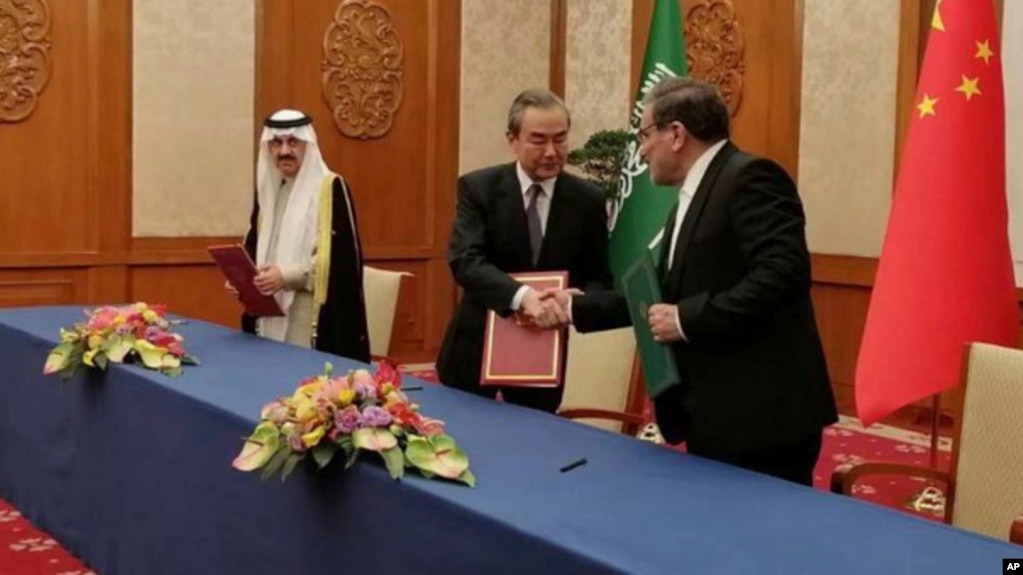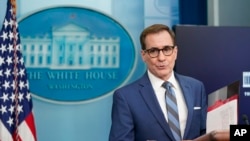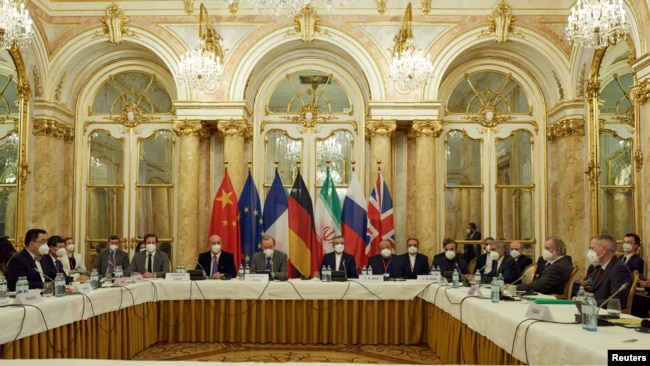美国威尔逊中心基辛格中美关系研究所所长罗伯特·戴利说,这是“中国外交的一个里程碑”,伊朗与沙特的协议不是中国偷偷摸摸的阴谋,中国公开而坚定地工作了好几年,才得以实现了这一目标。
他说:“如果美国在世界各国首都和全球论坛上继续缺席或代表性不足,那么它只能怪自己。”
The director of the Wilson Center's Kissinger Institute on China and the United States, Robert Daly told VOA.
The deal struck in Beijing this week is a "major diplomatic breakthrough for Tehran, Riyadh and Beijing". It is a "milestone for Chinese diplomacy."
"If America continues to be absent or underrepresented in world capitals and global fora, it will have only itself to blame," he said. "The Iran-Saudi deal did not result from some sneaky Chinese plot: China worked publicly and steadily for several years to achieve this end."
--- White House Welcomes Chinese-Brokered Saudi-Iran Deal
https://www.voanews.com/a/white-house-welcomes-chinese-brokered-saudi-iran-deal/6999700.html
沙特伊朗言和,国际社会欢呼,美国“酸溜溜”
在中国的斡旋下,沙特阿拉伯和伊朗这对中东地区的“宿敌”握手言和。
2023年3月12日
在中国的斡旋下,沙特阿拉伯和伊朗这对中东地区的“宿敌”握手言和。10日,中沙伊三方签署并发表联合声明,宣布沙伊双方同意恢复外交关系,强调三方将共同努力,维护国际关系基本准则,促进国际地区和平与安全。
联合声明一出,国际社会反响热烈,纷纷对中东地区两个大国实现和解表示欢迎,为中国积极劝和促谈的角色“点赞”。
据联合国新闻网报道,联合国秘书长发言人杜加里克10日在纽约总部的例行记者会上表示,秘书长古特雷斯对沙特阿拉伯、伊朗和中国在北京发表的三方联合声明表示欢迎。
报道称,古特雷斯对中国为促进沙特和伊朗两国之间的对话而承办近期的会谈表示感谢,同时赞赏阿曼和伊拉克等其他国家为此做出的努力。据悉,阿曼和伊拉克曾于2021年至2022年期间承办多轮沙伊对话。
阿拉伯世界也在第一时间纷纷表态。卡塔尔半岛电视台报道称,海湾阿拉伯国家合作委员会秘书长贾西姆·穆罕默德·布达维表示,对恢复沙特与伊朗关系的协议以及有助于加强该地区安全与和平的所有举措表示欢迎。海湾合作委员会国家分别发表声明欢迎这一事态发展。
土耳其阿纳多卢通讯社报道称,埃及外交部希望“该协议将缓解地区紧张局势,有助于稳定和维护阿拉伯国家安全的能力”。
伊拉克表示,它认为沙伊两国外交关系“翻开了新篇章”。
阿曼外交大臣赛义德·巴德尔·布赛义迪说:“这是双赢,将有利于地区和全球安全。从更长远来看,我们希望这还能够增加大家的经济获益。”
据卡塔尔通讯社报道,卡塔尔首相兼外交大臣穆罕默德·本·阿卜杜勒拉赫曼·阿勒萨尼表示,希望该协议能够促进该地区的安全与稳定,满足沙特、伊朗和整个地区人民的愿望。
也门胡塞武装组织、黎巴嫩真主党和巴勒斯坦哈马斯也发表声明表示欢迎。
相对于国际社会尤其是本地区对联合声明普遍持欢迎态度,一向自视在中东拥有重要影响力的美国,心态有点“酸”。
据美国之音电台网站报道,白宫国家安全委员会发言人约翰·柯比含混地表示:“如果这一协议能够持续——无论这样做的利益曾经是什么,或者谈判桌上曾经坐了什么人——只要协议能够持续,也门的战争能够结束,沙特再也不用不断地试图防御由伊朗资助和支持的胡塞武装的攻击,我们最终都对此表示欢迎。”
这种处处透露出不情愿、却又不得不“欢迎”的姿态,与联合国与阿拉伯世界的“欢迎”,形成了鲜明对比。
为了给美国强挽一些面子,柯比还强调说,美国也通过自己的“威慑和外交的有效结合”致力于缓和局势。他说,在北京宣布的路线图“看来类似于2021年和2022年在巴格达和阿曼马斯喀特举行的谈判”,美国曾支持那两次谈判。
他还补上一句:“伊朗方面是否会兑现协议还有待观察。”
相比美国官方的“酸溜溜”,美国学者则对中国发挥的积极作用不吝赞美。美国威尔逊中心基辛格中美关系研究所所长罗伯特·戴利说,这是“中国外交的一个里程碑”,伊朗与沙特的协议不是中国偷偷摸摸的阴谋,中国公开而坚定地工作了好几年,才得以实现了这一目标。
他说:“如果美国在世界各国首都和全球论坛上继续缺席或代表性不足,那么它只能怪自己。”
White House Welcomes Chinese-Brokered Saudi-Iran Deal

Despite its rocky relations with China, the White House says it welcomes Beijing's efforts to help end the war in Yemen and de-escalate tensions in the region following the announcement of a Chinese-brokered deal that allows Iran and Saudi Arabia to reestablish diplomatic relations after seven years of hostility.
"If this deal can be sustained — regardless of what the interest was or who sat down at the table — if it can be sustained, and the war in Yemen can end, and Saudi Arabia doesn't have to continually try to defend itself against attacks from the Houthis who are funded and supported by Iran, in the end we welcome that," said John Kirby, National Security Council coordinator for strategic communications, in a briefing to reporters Friday.
At the same time, Kirby sought to downplay the development, underscoring that the U.S. has also worked on de-escalation through its own "effective combination of deterrence and diplomacy." He noted that the road map announced Friday in Beijing appeared similar to plans negotiated in Baghdad and Muscat in 2021 and 2022 that aimed to renew ties between the two rival Middle East powers, which the U.S. supported.

National Security Council spokesman John Kirby speaks during a press briefing at the White House, Nov. 28, 2022, in Washington.
"It really does remain to be seen whether the Iranians are going to honor their side of the deal," Kirby added.
Tehran and Riyadh agreed to resume diplomatic relations and reopen respective embassies within two months, according to a statement issued by Iran, Saudi Arabia and China. "The agreement includes their affirmation of the respect for the sovereignty of states and the noninterference in internal affairs," it read.
Riyadh severed diplomatic ties with Iran in 2016 after demonstrators stormed its embassy in Tehran over the Saudi execution of Sheikh Nimr al-Nimr, a prominent Shiite Muslim cleric who was convicted of terror-related offenses.
For decades, the Saudi-Iran feud has fueled conflicts in the region. Reduced tensions between Riyadh and Tehran could have positive repercussions beyond Yemen, including in Lebanon, Syria and Iraq.
Diplomatic breakthrough
The deal struck in Beijing this week is a "major diplomatic breakthrough for Tehran, Riyadh and Beijing," said Robert Daly, director of the Wilson Center's Kissinger Institute on China and the United States. It is a "milestone for Chinese diplomacy," he told VOA.
The Saudi-Iran agreement was reached amid the perception among Gulf states that U.S. influence in Middle East is receding as Washington pours its resources into the war effort in Ukraine and U.S. strategic rivalry with China.
In an apparent jab at Washington in announcing the deal, Beijing said, "The world is not limited to the Ukraine issue."
"There are many issues related to peace and people's livelihood that require the attention of the international community and timely and proper handling by the parties concerned," Wang Yi, China’s senior foreign policy official, said in a statement.
Washington should use this as a wake-up call and reinvest in its own diplomacy, Daly warned.
"If America continues to be absent or underrepresented in world capitals and global fora, it will have only itself to blame," he said. "The Iran-Saudi deal did not result from some sneaky Chinese plot: China worked publicly and steadily for several years to achieve this end."
Riyadh's calculus
The Chinese-brokered deal is based on Riyadh's strategic calculus and does not mean it is choosing Beijing over Washington, said Alex Vatanka, director of the Iran program at the Middle East Institute. He pointed out that as Saudi Arabia aims for its "Vision 2030" blueprint to open the country, the Yemen conflict is putting off foreign investors and Riyadh is keen to end it.
"Who can help Saudi Arabia end the Yemen war? It's not the United States because the U.S. doesn't have leverage over Iran. It's China, which happens to be Iran's biggest trading partner," he told VOA.
Washington ended diplomatic relations with Iran in 1980 following the Iranian 1979 takeover of the American Embassy in Tehran. Despite Washington's heavy sanctions, it has little economic clout over the Islamic Republic.
Vatanka said it's unlikely this deal will affect Saudi and Gulf state relations with Washington, which will remain the region's security guarantor in the foreseeable future.

Officials wait for the start of a meeting of the JCPOA Joint Commission in Vienna, Austria, Nov. 29, 2021. (EU Delegation in Vienna/handout via Reuters)
Following the announcement of the deal, some expressed hope that it could lead toward a path to get Tehran to return to the Iran nuclear agreement, formally known as the Joint Comprehensive Plan of Action.
"The Biden administration has been unable to convince the Iranians to come back into compliance. Maybe China can do this, too," said Barbara Slavin, a Middle East and North Africa distinguished fellow at the Stimson Center.
"If so, it would really show that China is no longer kind of a secondary player when it comes to major diplomacy in the Middle East and in the world at large," she told VOA.
Despite the Saudi deal with Iran, observers say Gulf states likely will continue to pursue closer ties with Tehran's rival Israel, including working toward diplomatic normalization through the U.S.-led Abraham Accords.
The White House said it fully supports Israel's integration into the Middle East region, including ultimately with Saudi Arabia.
"We have also established new formats for engagement," a National Security Council spokesperson told VOA, pointing to the Negev Forum between Israel's Abraham Accords and treaty partners and the I2U2 platform between India, Israel, the United Arab Emirates and the U.S. as "public examples of critical work that is otherwise going on behind the scenes."
NSC's Kirby would not confirm reporting that Saudi Arabia has informed the U.S. that it will sign on to the Abraham Accords if the administration agrees to provide Riyadh with additional security guarantees and help it develop a civilian nuclear program.
U.N. spokesperson Stephane Dujarric also welcomed the announcement.
"The secretary-general has expressed his appreciation to the People's Republic of China for hosting these recent talks and for promoting dialogue between the two countries," he said in a statement. "Good neighborly relations between Iran and Saudi Arabia are essential for the stability of the Gulf region."
Adrianna Zhang and Margaret Besheer contributed to this report.
Editor’s note: This story has been updated to correct the title of Wang Yi.